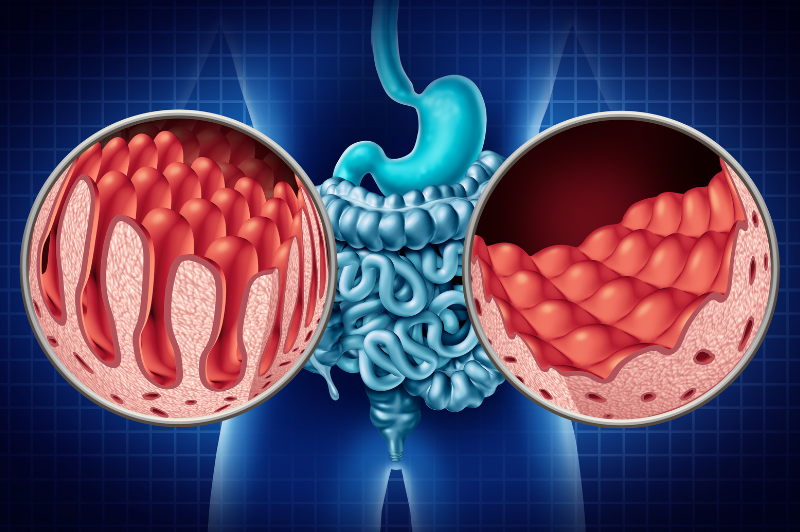Celiac disease is estimated to affect approximately 1% of the population but many people suffer for years without a proper diagnosis due to the wide variety of possible symptoms. Undiagnosed celiac disease can have a significant impact on your quality of life and long-term health so it’s important for us to spread awareness and ensure this doesn’t happen to you!
What is celiac disease?
The Canadian Celiac Association defines celiac disease as “a multi-system autoimmune disorder that is triggered by ingestion of gluten (a protein in wheat, rye and barley) in genetically susceptible individuals.” Do you notice how the definition doesn’t say anything about digestive symptoms? In all individuals with celiac disease, gluten damages the absorptive surface of the small intestine leading to poor absorption of nutrients. However, patients can present with either intestinal symptoms or non-intestinal symptoms (or both!).

What are the symptoms of celiac disease?
The most common symptoms associated with celiac disease are: chronic diarrhea, abdominal pain, weight loss, and malabsorption. It can be diagnosed at any point in your life and is not just a childhood disease. In children, it is essential to screen for celiac disease if they are experiencing failure to thrive (not following their expected growth curve).
One of the most common misconceptions about celiac disease is that the above symptoms MUST be present for a diagnosis to occur. This is not the case. The theme for Celiac Awareness Month this year is #GoBeyondTheGut. We need to start recognizing that celiac disease can be present without the classic digestive symptoms. Here is a list of just a few of the non-classical symptoms of celiac disease:
- Chronic fatigue
- Chronic constipation
- Recurrent Vomiting
- Iron Deficiency Anemia
- Osteoporosis
- Infertility
- Dental enamel defects
- Neurological problems, such as peripheral neuropathy
What is the testing process for celiac disease?
Talk to one of our Naturopathic Doctors about doing the screening blood test. If the screening test comes back positive, you’ll need to see your medical doctor for a referral to a gastroenterologist so that you can have an intestinal biopsy done to confirm the diagnosis. Celiac disease cannot be definitively diagnosed based on the screening blood test alone!
Can’t I just try eating gluten free and see if I feel better?
Unfortunately, the answer to this question is no. First of all, you must be eating gluten to be accurately tested for celiac disease. If you start on a gluten free diet and then notice symptom improvement, you would have to start eating gluten again (often for up to 3 month) to get an accurate test result for celiac disease. For this reason, it’s ideal to get screened for celiac disease before starting a gluten free diet.
You might be wondering why it would be necessary to go back on gluten to get a proper diagnosis if you’re feeling better anyways. Couldn’t you continue on your gluten free diet without a confirmed celiac diagnosis? Although following a gluten free diet is becoming increasingly popular, a gluten free diet by choice is very different than the gluten free diet that must be followed for the treatment of celiac disease. When you are diagnosed with celiac disease, your gluten free diet must be strict, life-long, and avoid even small amounts of gluten cross-contamination. It is important to have the proper diagnosis so you can follow the correct diet.

How does this compare to non-celiac gluten sensitivity?
If you’ve tested negative for celiac disease but still feel strongly that you react negatively to gluten, you might have non-celiac gluten sensitivity (NCGS). There seem to be a subset of people who test negative for celiac disease but still develop symptoms when they consume gluten.
The difference between celiac and NCGS is that people with NCGS have no celiac antibodies and no intestinal damage. There are also no biomarkers for the diagnosis of NCGS. The only way to be diagnosed with NCGS is to rule out celiac disease and then follow a gluten-free diet. If your symptoms resolve on a gluten-free diet, there’s a good chance you suffer from non-celiac gluten sensitivity.
Do you read this and wonder if you should be tested for celiac disease? Or if your child or another family member should be tested? Book an appointment with one of our naturopathic doctors to find out whether testing is right for you. Our naturopathic doctors can also support you in starting a gluten free diet in a safe and healthy way!
References:
Canadian Celiac Association. Retrieved from: https://www.celiac.caRashid M, Lee J: Serologic testing in celiac disease: Practical guide for clinicians. Can Fam Physician. January 2016 62:38-43. Retrieved from: http://www.cfp.ca/content/62/1/38.full





